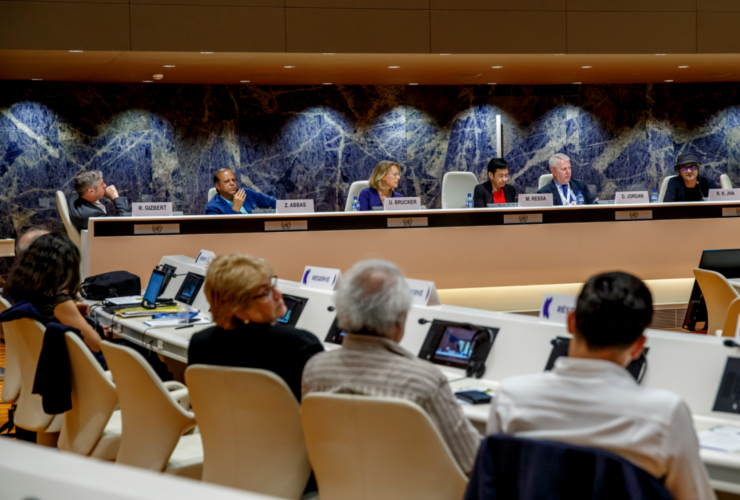On the opening day of the International Press Institute (IPI)’s 2019 World Congress in Geneva, Switzerland, leading editors called for greater efforts to expose and combat targeted online smear campaigns against journalists.
Speaking at the World Congress’s Town Hall Meeting, Zaffar Abbas, editor of the Pakistani daily Dawn, said state and non-state actors were increasingly “weaponizing social media to attack independent journalists”. Dawn has been repeatedly smeared as “anti-state” in orchestrated campaigns to undermine its credibility.
Despite the attacks, Abbas said he remained steadfast. “Should I give up on the values that brought me to this profession? I cannot do that. The fight has to go on until we evolve a strategy” to counter the attacks.
Maria Ressa, editor of the Philippine news site Rappler, urged media to tackle smear campaigns by engaging in “digital forensics” – investigative work to expose the “cheap armies” behind such campaigns and who is behind him.
“The only way to beat social media algorithms is if we, as the guardians of facts, spread the facts”, she said. Ressa was named as one of TIME Magazine’s Persons of the Year in 2018 for her refusal to give in to vicious attacks against her and Rappler propagated by President Rodrigo Duterte and elements of the Philippine government.
David Jordan, director of editorial policy and standards at the BBC, said that anti-press attitudes from politicians in the UK had trickled down to the public. “Most politicians define impartiality as agreeing with them”, he said. “And increasing numbers of the electorate are starting to align with that view”, leading to increased social media attacks on journalists.
The Town Hall Meeting was followed by a special presentation honouring courage in journalism, highlighting past recipients of IPI’s World Press Freedom Hero and Free Media Pioneer awards. Both awards are given in partnership with International Media Support (IMS), which co-led the presentation.
IPI Executive Director Barbara Trionfi said IPI had been on the front lines defending press freedom and the rights of journalists for almost 70 years. “Through this time, we have observed one constant: the bravery of journalists to persevere, even in the direst of circumstances, even in the face of most brutal dictatorships, in pursuit of the truth. It is this constant that leaves us optimistic that quality, independent journalism will never be silenced”, she said.
The presentation honoured five IPI World Press Freedom Heroes and representatives of IPI-IMS Free Media Pioneer organizations present at the Congress, many of whom reflected on the significance of the awards for their work.
Mazen Darwish, who was named an IPI World Press Freedom Hero in 2015 while jailed in Syria, said that “after four years in prison, this award means that people have not forgotten you. You see that you are part of an international movement and are not alone.”
Turkey’s Ruşen Çakır, founder of the journalism platform Medyascope, which received the 2015 IPI-IMS Free Media Pioneer award, noted that, in a polarized country like Turkey, “all parts are pulling you to be an activist instead of a journalist. We are trying to do journalism beyond the polarization. As long as we manage to keep this goal, I think we will survive.” Medyascope is one of the few remaining sources of independent information in Turkey, where nearly 140 journalists are behind bars.
Daoud Kuttab, founder of Jordan’s Community Media Network and who was named an IPI World Press Freedom Hero in 2000, shared his advice for young journalists. “I would tell young journalists to think about content. There are already many platforms, so now it is time to think content in two ways. You can either do national investigative journalism or give voice to the voiceless.”
Ressa, representing Rappler, the 2018 IPI-IMS Free Media Pioneer, said the recognition had given her team “energy and solidarity”. She added: “When you hold the line, others will come behind us.”
Also honoured was Savea Sano Malifa, founder of the Samoa Observer, the leading independent media outlet in the Pacific state of Samoa. Named an IPI World Press Freedom Hero in 2000, Malifa had endured a litany of attacks to silence his critical voice. Asked how he was able to persevere, Malifa told participants at this year’s Congress: “We say to ourselves that you just have to have the truth. Just keep on publishing. That is exactly what we have been doing.”
